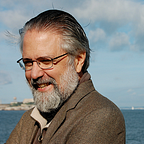Capone‘s Mayor
The components that merged to enrich Chicago’s Prohibition gangsters were an eminently corruptible police force; a large population of European immigrants who were damned if they were going to give up their wines, whiskeys, and beers; and the election of Len Small, perhaps the most corrupt Governor of any state in the Union (which was saying something).
Certainly the boodling, boozy, bloviating Mayor of Chicago, William Hale “Big Bill” Thompson, deserves star billing on that list. But which Mayor Thompson? There were at least three: “Big Bill the Builder,” whose public works included playgrounds, widened streets, and bridges; “Kaiser Bill,” so-called because of his obdurate and vocal refusal to support the war effort during World War I; or “Boodler Bill,” the slovenly, alcoholic blowhard who declared Chicago a “wet” city and did what he could to keep it that way.
The third descriptor fits the bill, but they all overlapped, and there’s an element to his bad reputation that derives from the animosity between the Anglo elites who had the local press at their disposal versus working men, labor unions, outnumbering European immigrants and black migrants from the Deep South . Despite his Boston Brahmin background, Thompson was a traitor to his class: shrewd enough to appeal to the ever increasing urban middle class, for which many men of his class never forgave him.
Thompson was born in Boston in 1869, but when he was still an infant, his Brahminical father moved the family to Chicago, where the Civil War veteran became a wealthy member of the city’s elite. But “Big Bill” resisted the trappings of his family’s eminence and at the age of 14 persuaded his father to let him go West and learn cattle ranching.
Thompson grew into a broad, towering cowboy who could hold his own in the brawls and binges of the Far West. By 1890, he had amassed a respectable stake of $30,000 (almost a million in today’s dollars). But after his father’s death a couple of years later, he reluctantly returned to Chicago, where he left the management of his father’s real estate fortune to an agent and spent most of his time carousing, sailing, and playing sports.
He became something of a public figure: conspicuous not only for his athletic prowess, but for his massive physique, bespoke suits, and a hearty if indiscriminate geniality. Tired of the machinations of the various athletic leagues that oversaw amateur sports, he resisted his friends’ urgings to run for public office until one of them bet him $50 that he didn’t have the guts. The local Republican machine ran him successfully for alderman in 1900, and observed that as a candidate in a city of xenophobic ethnic communities, he was a natural. Glib, jovial, imposing, and entirely lacking in scruples, he had a knack for telling each warring constituency what it wanted to hear and addressing his contradictions with a wink and a nod.
He began to campaign on an America-first, anti-immigration plank, although the immigrants he denounced were his fellow WASPs: an Anglo elite whom he accused of evading taxes, infiltrating the Federal Government, and colluding with King George V to destroy American democracy and return the country to British rule.
His pitch resonated with more recent immigrants from Germany, Italy, and Eastern Europe, who would go on to elect him to three nonconsecutive terms. His hokum and hoopla made great copy. He liked to ride horses in parades and don a sombrero from his cowboy days, once debated a couple of caged rats, and between terms launched a widely publicized expedition to film a South-Pacific tree-climbing fish that got no further than New Orleans. Nationally, however, it was his coarse language, his hyper-patriotic proclamations, his wild theories, the scandals that rocked each of his administrations, his defiance of Prohibition, and his unapologetic association with Al Capone that earned him ridicule and denunciation.
According to a reporter who interviewed Capone, he gave a photograph of Big Bill pride of place on the wall behind his desk, between Lincoln and Washington. Weary of reformist Mayor Dever’s hapless but inconvenient crackdowns, Capone is said to have donated some $260,000 to Thompson’s campaign to return to City Hall, reportedly in exchange for His Honor’s assurance that he would turn Chicago back into an “open city:” a promise he kept until he was voted out of office in 1931, the same year Capone was convicted of tax evasion.
After Thompson’s loss to Democrat Anton Cermak, the Chicago Tribune bid him good riddance: “For Chicago Thompson has meant filth, corruption, obscenity, idiocy and bankruptcy…. He has given the city an international reputation for moronic buffoonery, barbaric crime, triumphant hoodlumism, unchecked graft, and a dejected citizenship.”
He tried to run for Illinois governor in 1936, but received only 3% of the vote, and three years later lost the Republican mayoralty primary by over 50% to future Governor Dwight Green who had made his mark assisting in the prosecution of Capone and his fellow gangsters.
After Thompson’s death in 1944, two safe deposit boxes in his name were found to contain $1,840,000 in cash and bonds, some of which the IRS carted away. Most readily assumed that his cache must have derived from bribes and kickbacks, however he remained wealthy in his own right with income derived from his late father’s real estate holdings. Be that as it may, Thompson left the local Republican establishment in such disrepute and disrepair that to this day Chicago has never elected another Republican mayor. But “Big Bill” lives on in Chicago lore, if only as the worst mayor in American history.
Copyright © 2017 by AndrewWard. All rights reserved.
